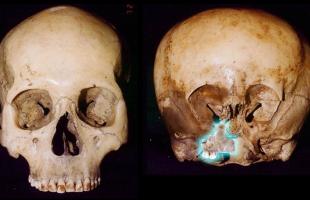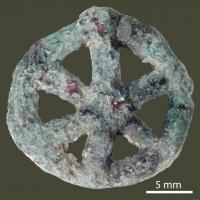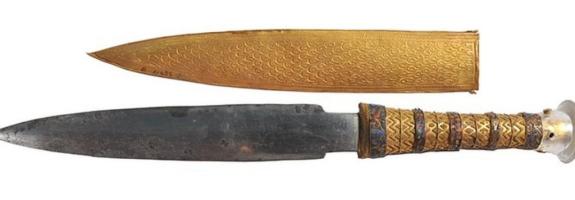Copy Link
Add to Bookmark
Report
The Art of Technology Digest 3

The Art of Technology Digest #3 Sunday, August 16th, 1992
%%AoT%%%%AoT%%%%AoT%%%%AoT%%%%AoT%%%%AoT%%%%AoT%%%%AoT%%%%AoT%%%%AoT%%%%AoT%%
Editor: Chris Cappuccio (ccappuc@caticsuf.cati.CSUFresno.EDU)
BBS Archivist: David Mitchell (dmitchel@ais.org)
Special thanks to...
E-Mail Archivist: Mike Batchelor (mike@batpad.lgb.ca.us)
[AoT Digest] Contents #3 (Sun, August 16th, 1992)
Article 1: New AoT-Digest Distribution
Article 2: CNID Press Release
Article 3: Online Access To Congressional Information
Article 4: Internet Access Available
Article 5: Encryption Bull
Article 6: Clinton/Gore online
Article 7: Pirates v. AT&T: Posters
Article 8: Intel Releases 486 DX2 66 Megahertz Chip
Article 9: Re: Internet Abuse & It's Affects
Article 10: Important Warning To Post At Your Workplace
The Art of Technology Digest is distributed in the following ways:
By E-MAIL, send e-mail to mailserv@batpad.lgb.ca.us and, to subscribe to
Art of Technology Digest, leave the subject blank and enter: SUBSCRIBE aotd.
To get a back-issue of Art of Technology Digest, leave subject blank and
enter: GET aotd/vol<number>.zoo UUENCODE (Example: To get AOT-D number 2,
use GET aotd/vol2.zoo UUENCODE). To get an index of Art of Technology Digest,
leave subject blank and enter: INDEX. To get AoT-D by BBS, Call
+1 313 464 1470, Live Wire BBS. This system maintains a complete collection
of AoT Digest. Speeds are 1200/2400/HST-9600/HST-14,400.
The Art of Technology Digest is an open forum dedicated to sharing
information among computerists and to the presentation and debate of
diverse views. AoT-D material may be reprinted as long as the source
is cited. Some authors do copyright their material, and they should
be contacted for reprint permission. It is assumed that non-personal
mail at the moderators may be reprinted unless otherwise specified.
Readers are encouraged to submit reasoned articles relating to
computer culture and communication. Articles are preferred to short
responses. Please avoid quoting previous posts unless absolutely
necessary. All articles for submission should be sent to:
ccappuc@caticsuf.cati.CSUFresno.EDU
DISCLAIMER: The views represented herein do not necessarily represent
the views of the moderators. Digest contributors assume all
responsibility for ensuring that articles submitted do not
violate copyright protections.
"Republicans understand the importance of bondage between a mother and child."
-- Vice President Dan Quayle
---------------------------------------------------------------------------
From: Chris Cappuccio, Editor <ccappuc@caticsuf.cati.CSUFresno.EDU>
Date: 8/14/92
Subject: Article 1--New AoT-Digest Distribution
As of 8/14/92, AoT-Digest will no longer be distributed from my e-mail
address, ccappuc@caitcsuf.cati.CSUFresno.EDU, but from the mailserver at
mailserv@batpad.lgb.ca.us. It uses *Listserv-like* commands and is a
distribution point for AoT-Digest through e-mail. If you are wondering the
reason for this, it is because the IDS mailer at ATI-Net screws up if you
have more than 50 per mailing list.
AoT-Digest is also on Mike's BBS, The Batchelor Pad PCBoard. You can reach
it at (310)494-8084, 2400-14400 v.32bis.
IMPORTANT: Any articles for submission or any mail to the editor should be
sent to: ccappuc@caticsuf.cati.CSUFresno.EDU. Do not send submissions to
the mailserv address.
------------------------------
Date: Mon, 10 Aug 1992 15:59:31 PDT
From: Nikki Draper <draper@Csli.Stanford.EDU>
Subject: Article 2--CNID press release
PACIFIC BELL'S PHONE PRIVACY RINGS FALSE, SAYS
COMPUTER PROFESSIONALS FOR SOCIAL RESPONSIBILITY
PALO ALTO, Calif., August 10, 1992 -- Computer Professionals for
Social Responsibility (CPSR), a national alliance of professionals
concerned with the impact of technology on society based here,
expressed deep concern over Pacific Bell's attempt to gut a recent
California Public Utility Commission (PUC) order on Calling-Number
Identification (CNID). Pacific Bell has requested a rehearing on the
PUC restrictions. PacBell's proposal will eliminate important safety
and privacy protections in the Commission's order, CPSR charged.
CNID allows businesses to collect the phone numbers of customers
who call them.
The Commission's order guarantees privacy protections for all
Californians. PacBell proposes to eliminate a key privacy protection
called Per-Line Blocking with Per-Call Unblocking. This feature
prevents home numbers from being collected by businesses, unless
the caller decides to give it to them. Phone companies would prefer
to only offer per-call blocking, a scheme in which caller numbers are
always given out unless the caller remembers to dial a blocking code
before dialing the desired number.
"If this happens, Californians will inevitably receive more junk mail,
more annoying phone calls, and greater invasions of their privacy,
some of which may be dangerous," said CPSR Chair and user interface
expert, Dr. Jeff Johnson.
PacBell claims that CNID would give people more control over their
privacy by providing the phone number from the calling phone. This
is the wrong technological answer to the problem according to
Johnson. "What people want to know is who is calling, not what
phone is being used. If my wife's car breaks down and she calls me
from a pay phone, that's a call I want to answer. CNID doesn't give
me any information that will help me do that."
In PUC hearings held last year, Johnson accused the phone companies
of designing a service that is more useful for businesses in gathering
marketing data than for consumers in screening calls. Phone
companies are opposed to per-line blocking because it would
presumably result in more numbers being kept private, thereby
reducing the value of the CNID service to business subscribers.
"Phone companies don't want you to block your phone number when
you call movie theaters or appliance stores. The more times your
number is revealed to businesses, the better! So they oppose
reasonable blocking options and are pushing an error-prone one," he
said.
If only per-call blocking were available, residential phone customers
-- or their children, parents, grandparents, guests -- would often
forget to dial their blocking code before making a call, resulting in
frequent disclosure of private information to businesses without the
consent, and sometimes even without the knowledge, of the caller.
"Unless PacBell is willing to live within the very reasonable bounds
set by the PUC decision, the concerns of Californians will be far better
served if CNID is simply not offered at all," said Johnson.
"Subscriber privacy is more important that Pacific Bell's profits."
Founded in 1981, CPSR is a public interest alliance of computer
scientists and other professionals interested in the impact of
computer technology on society. As technical experts and informed
citizens, CPSR members provide the public and policy makers with
realistic assessments of the power, promise, and limitations of
computer technology. It is a national organization, with 21 chapters
throughout the United States. The organization also has program
offices in Washington D.C. and Cambridge, MA.
For information on CPSR, contact the national office at
415-322-3778 or cpsr@csli.stanford.edu.
------------------------------
Date: Mon, 10 Aug 1992 22:13:41 EDT
From: James P Love <LOVE@pucc.PRINCETON.EDU>
Subject: Article 3--ONLINE ACCESS TO CONGRESSIONAL INFORMATION
Information Access Memorandum
To: Citizens interested in public access to government
information
Re: Public Access to U.S. House and Senate Legislative
Information Systems (LEGIS)
Date: July 21, 1992
Dear friend:
The following letter to Senator Ford (D-KY) and Representative
Rose (D-NC) asks for public access to the House and Senate LEGIS
systems. LEGIS provides online access to the full text of bills
before congress, as well as other items. Access is now
restricted to members of congress and their staff. (except for
limited walk-in service).
If you want to join us in asking for remote online access to this
important taxpayer funded information system, please provide us
with the following information, along with permission to add your
name to the letter.
Name
Affiliation
(for purposes of
identification only)
Address
City, State and Zip Code
Telephone (for verification)
email address
Please send (mail, fax, or email) this information to:
Taxpayer Assets Project
P.O. Box 19367
Washington, DC 20036
voice:202/387-8030
fax:202/234-5176
internettap@essential.org
Thank you.
James Love
Director
Taxpayer Assets Project
------------------------------------------------------------------------
Senator Ford
Chairman, Senate Committee
on Rules and Administration
U.S. Senate
Washington, DC 20510
Representative Rose
Chairman, Committee on
House Administration
U.S. House of Representatives
Washington, DC 20515
August XX, 1992
RE: Public Access to Senate and House LEGIS
Dear Sirs:
This letter is to request that the public be granted access to the
Legislative Information Systems operated by the United States Senate and
House of Representatives. These taxpayer financed information systems
provide online access to information of immense interest to millions of
citizens. (For purposes of this letter the two systems will be referred
to simply as LEGIS).
Examples of the information contained in LEGIS are:
- Summary information about the content and status of all
Senate and House bills, resolutions, floor amendments,
public and private laws
- Full text of the latest versions of Senate and House bills
- Summary information on all Presidential nominations
requiring Senate confirmation
- Summary information on treaties submitted to the Senate for
ratification
- Summary information on communications from the executive
branch and state and local governments on matters before the
Congress
Our specific recommendations are as follows:
1. CITIZENS SHOULD BE ABLE TO SEARCH LEGIS ONLINE FROM REMOTE
LOCATIONS.
While the public pays for the operation of LEGIS we have never
been allowed access, except for limited walk-in access in
Congressional reading rooms. This policy should change. In a
period when Congress is seeking to reform itself, it is
appropriate to extend access to these valuable information
systems beyond the members and staff of congress, to the citizens
whom they serve.
2. PUBLIC ACCESS TO LEGIS SHOULD BE MODELED ON THE PROPOSED GPO
GATEWAY TO GOVERNMENT/WINDO LEGISLATION.
As sponsors of S. 2813, the GPO Gateway to Government, and H.R.
2772, the GPO Wide Information Network for Data Online (WINDO),
you have worked hard to expand public access to federal
databases. Should the Gateway/WINDO become law, LEGIS should be
among its initial core databases. In any event, the approach
taken in these two bills is appropriate for LEGIS.
[[ED: More information on the Gateway/WINDO is in AoT-Digest #2]]
- The public should have the right to subscribe to online
access to LEGIS from remote locations. For most
subscribers, the cost of the subscription should be based on
the incremental cost of providing such access.
- LEGIS information should also be made available without
charge through the federal Depository Library Program. As
you know, this important program, which began in the middle
of the 19th century, is designed to promote universal access
to federal government information.
3. CONGRESS SHOULD REGULARLY SOLICIT FEEDBACK FROM LEGIS USERS
TO DETERMINE IF THE SYSTEM CAN BE IMPROVED.
There are several areas where LEGIS could be improved. For
example, some citizens may ask that Congress provide more
detailed information on voting, committee actions, or other
congressional business. Citizens should have opportunities to
identify the types of information that would be useful in
monitoring the actions of the Congress.
Your support for the Gateway/WINDO bills is deeply appreciated,
as are your other efforts to broaden public access to databases
and information systems that are financed by the taxpayer.
Please inform us of the specific steps that you will take to
broaden public access to LEGIS. Thank you.
Sincerely,
-----------------------------------------------------------------
The following persons will be among those signing the letter
asking for public access to LEGIS:
Joan Claybrook Howard C. Weaver
President Editor
Public Citizen Anchorage Daily News
2000 P Street, NW Box 149001
Washington, DC 20036 Anchorage, Alaska 99514-9001
Brian Kahin Jack D. Lail
Director, Information Metro Editor
Infrastructure Project, Knoxville News-Sentinel
Science, Technology and P.O. Box 59038
Public Policy Program Knoxville, TN 37950-9038
John F. Kennedy School of
Government, Harvard University Marc Rotenberg
79 John F. Kennedy St. Director, Washington Office
Cambridge, MA 02138 Computer Professionals for
Social Responsibility
Professor James Galbraith 666 Pennsylvania Ave., S.E.
LBJ School of Public Affairs Suite 303
and Department of Government Washington, DC 20003
University of Texas at Austin
Austin, TX James Love
Director
Howard Rheingold Taxpayer Assets Project
Editor P.O. Box 19367
Whole Earth Review Washington, DC 20036
27 Gate Five Road
Sausalito, CA 94965 Dr. James R. Veatch
hlr@well.sf.ca.us Nashville Tech Library
120 White Bridge Road
Nashville, TN 37209-4515
-----------------------------------------------------------------
James Love, Director VOICE: 609-683-0534
Taxpayer Assets Project FAX: 202-234-5176
P.O. Box 19367 INTERNET: love@essential.org
Washington, DC 20036
------------------------------
From: greenie@drycas.club.cc.cmu.edu
Subject: Article 4--Internet Access Available
Date: 8 Aug 92 11:28:01 -0500
Attention Internet Users:
There is an Online Service reachable through the Internet that offers
stimulating conversation and entertainment. We have RIME conferences
online as well as Usenet NEWS and other local message areas. We also
have File Transfers available for many computer types, with either modem
or network file transfer capability (XMODEM, ZMODEM and FTP).
We have access to several MUDs including Vincents Hollow, and great
multi-player games such as Conquest, a full-screen space battle game,
and other entertainment sections, such as a CB Simulator and IRC Chat.
We host weekly CB conferences on various topics ranging from education
instruction practices to events on current affairs (such as the LA
riots and associated happenings). People from all over the world
participate in our message areas - bringing the world closer together
to form a global meeting place.
We offer Internet access to all users, however Commercial users are
restricted to non-NSFnet access. Only Educational and Research uses
are permitted over the NSFnet.
TELNET, FTP, MAIL, FINGER, and TALK access is available online.
The name of the system is the IDS World Network. How can you get there?
Modem: (401) 884-9002 (high speed numbers available upon request)
Internet: telnet ids.net [155.212.1.2]
Members of the Education and Research community are invited to participate,
as we are constantly looking to link users from these groups together.
Andy, sysadmin@ids.net
------------------------------
From: Editor, Chris Cappuccio <ccappuc@caticsuf.cati.CSUFresno.EDU>
Date: Thursday, August 13th, 1992
Subject: Article 5--Encryption Bull
I think that any laws the government has on how you can encrypt data,
where you can bring the data, or what you can do with the encrytion method
is a bunch of bull. I am not sure about what the laws actually are, but I
heard that many US products which have encryption, DES or otherwise, are not
allowed in other countries and then to be taken back to the US. It's not a
matter of security. It is volating our rights. People across the world cannot
register PKWare's PKLITE because they can't use the -e option in their country
is pretty bad. We have free speech. That's great. We don't have the right to
encrypt e-mail because a new law is coming. How are they going to stop us?
UU/XX Encoding is, in a way, a form of encryption, isn't it?? So what's the
big deal if I send somebody an encrypted form of AoT-D because I don't want
anybody else reading it until it is actually released? There's no security
matter involved. DES Encryption is used by the government only for Un-
classified and sensitive information (If I remeber all those NTISS and DoD/
NCSC Memorandums correctly). And, think about this, why does the government
even waste time encrypting *unclassified* documents, when anybody can simply
write the IAOC (INFOSEC Awareness Division; ATTN: X713/IAOC; Fort George G.
Meade, MD 20755-6000; (410)766-8729 Barbara Keller) and get some unclassified
government documents for free (sort of like a free version of the GPO). If
anybody actually knows the laws for this or has another opinion, please
respond.
------------------------------
Date: 13 Aug 92 12:41:36 EDT
From: Clinton for President <75300.3115@CompuServe.COM>
Subject: Article 6--Clinton/Gore online
Chris & David,
Thanks for the index. How about an article about Clinton/Gore online?
Compuserve, AOL, Internet, and starting to appear on BBS systems.
Here are a few of our addresses. Next week we will up on interent at:
Clinton-Gore.ORG
Regards,
JPG
Clinton/Gore HQ
Internet address for Clinton/Gore Library:
They will be on world.std.com accessible directly or via anonymous FTP
and will be in the directory:
/obi/USElection/President/Clinton/
-Barry Shein
Software Tool & Die | bzs@world.std.com | uunet!world!bzs
Purveyors to the Trade | Voice: 617-739-0202 | Login: 617-739-WRLD
______________________________________
For files on Specific Solutions BBS in Stafford, TX or Fidonet :
Instructions for accessing file library on SSMC:
For normal modem using folks:
Call 713-568-8482 (300bps - 9600 HST bps) (V.32 .32bis soon)
Log on according to the instructions.
When at the main menu type "C 2" (change to area 2)
Type "F" to review file listing for current area.
Type "D" for download, or "T" for online "type" mode.
For fidonet sysops:
F'req from 1:106/960 by filename.
-----------------------------------------------
Many thanks to our friends who have created libraries for us.
Regards,
JPG
Clinton/Gore HQ
------------------------------
From: Legacy Irreverent and Captain Picard (Phrack #40 Loopback)
Subject: Article 7--Pirates v. AT&T: Posters
[[ED: This was funny the first time I read it. It's from Phrack 40,
article #2 (Phrack Loopback)]]
Pirates v. AT&T: Posters
~~~~~~~~~~~~~~~~~~~~~~~~
Special thanks to Legacy Irreverent and Captain Picard
On May 24 1992, two lone pirates, Legacy (of CyberPunk System) and Captain
Picard (of Holodeck) had finally had enough of AT&T. Together, they traveled
to the AT&T Maintenance Facility (just west of Goddard, Kansas) and claimed the
property in the name of pirates and hackers everywhere.
They hoisted the Jolly Roger skull and crossbones high on the AT&T flagpole,
where it stayed for two days until it was taken down by security.
This event was photographed and videotaped by EGATOBAS Productions, to preserve
this landmark in history. And now you can witness the event. For a limited
time they are offering full color posters and t-shirts of the Jolly Roger
Pirate flag flying high over AT&T, with the AT&T logo in plain view, with the
caption; "WE CAME, WE SAW, WE CONQUERED."
Prices: 11" x 17" Full Color poster........................... $ 7.00 US
20" x 30" Full Color poster $20.00 US
T-shirts $20.00 US
If you are interested in purchasing, simply send check or money order for the
amount, plus $1.00 US for postage and handling to:
CyberPunk System
P.O. Box 771027
Wichita, KS 67277-1072
Be sure to specify size on T-shirt.
A GIF of this is also available from CyberPunk System, 1:291/19, 23:316/0,
72:708/316, 69:2316/0. FREQ magicname PIRATE
------------------------------
Date: 08/10/92
From: Linda Rohrbough/Grant Buckler
Subject: Article 8--Intel Releases 486 DX2 66 Megahertz Chip
****Intel Releases 486 DX2 66 Megahertz Chip 08/10/92 SANTA CLARA,
CALIFORNIA, U.S.A., 1992 AUG 10 (NB) -- Intel has announced its fastest
version of the speed doubler family microprocessor chips, the 486 DX2
66 megahertz (MHz) clock speed central processing unit (CPU), is now
shipping.
The chip is designed to help original equipment manufacturers (OEMs) to
upgrade the computing performance of computers they've already
manufactured without redesigning their motherboards. The new DX2 chip
runs internally at 66 (MHz), but works on motherboards designed for 33
(MHz) so a simple replacement of the CPU is all that is necessary to
upgrade the computer.
While the 66 MHz processing speed means the data may move through the
chip faster, it may still have to wait on the slower 33 MHz motherboard
to get to it. Intel estimates users will see performance increases of
as much as 70 percent overall.
This is the highest performance chip in the DX2 family. Earlier this
year Intel released a 486 DX2 50 MHz chip designed to be placed in
motherboards designed for the 486 DX 25 MHz CPU.
On the heels of the Intel announcement, several major manufacturers
have announced the availability of personal computers based on the new
chip. Dell, Compaq, and Everex, have announced new models based on the
486 DX2 66 MHz chip. IBM has announced an upgrade card so users can
upgrade PS/2 Model 90 and 95 systems.
A consumer version of the chip, so users can upgrade a 486 33 MHz IBM
or compatible personal computer to the 486 DX2 66 MHz is expected next
year. Intel already has a consumer version of its 486 DX2 50 MHz chip
which can replace the 486 DX 25 MHz chip.
In order to ramp production on the 486 DX2 line, Intel has already
announced it is putting off the release of the next generation chip,
internally code named the P5, until next year as well.
Intel says the 486 DX2 66 MHz chip costs $682 each in quantities of
1,000 and the company says it has shipped more than 20,000 of them
already.
(Linda Rohrbough/19920810/Press Contact: Nancy Pressel, Intel, tel
408-765- 8080, fax 408-765-1821)
IBM Offers 66MHz DX2 Upgrade For Top-End PS/2s 08/10/92 WHITE PLAINS,
NEW YORK, U.S.A., 1992 AUG 10 (NB) -- Like several of its rivals, IBM
has wasted no time in offering customers Intel's new top-of-the-line
microprocessor. IBM announced that the 66-megahertz 486DX2 chip is
available now as a processor complex upgrade for its Personal System/2
Model 90 and Model 95 machines.
The new 486DX2 uses Intel's clock-doubling technology to run at 66
megahertz internally while exchanging data with the rest of the system
at 33 megahertz. According to IBM, using it to replace the existing
processor in a Model 90 or 95 PS/2 can boost the machine's over-all
performance by as much as 71 percent.
The processor upgrade card replaces the existing microprocessor, memory
controller, memory cache options, and control for system throughput.
IBM said the upgrade card is ideal for the high-performance
requirements of computer-aided design and manufacturing (CAD/CAM),
financial modelling, image and presentation graphics, and other
compute-intensive applications.
The 486DX2-66 upgrade can be installed in PS/2 Model 90 XP 486 and
Model 95 XP 486 systems. At Newsbytes' deadline, an IBM spokesman was
unable to confirm whether an end-user can install the card or whether
it requires a technician.
US customers can purchase the upgrade from IBM-authorized dealers and
remarketers, as well as direct from IBM. For installation information
and technical guidance, customers can call on IBM's Systems Support
Center in Dallas.
Customers can upgrade from a 20-megahertz 486SX processor for $3,000,
from a 25-megahertz 486SX for $2,500, from a 33-megahertz 486DX chip
for $2,170, and from a 50-megahertz 486DX2 for $1,670.
Initial supplies are shipping now and the upgrade will be available in
volume "soon," the spokesman said.
Rivals Compaq and Dell have also announced machines based on the new
66-megahertz DX2 chip.
(Grant Buckler/19920810/li, IBM,
914-642-53670)
------------------------------
From: kadie@herodotus.cs.uiuc.edu (Carl M. Kadie)
Subject: Article 9--Re: internet abuse & its affects
Date: Wed, 12 Aug 1992 16:12:38 GMT
=============== ftp.eff.org:pub/academic/faq/netnews.writing ===============
q: Should my university allow students to post to Netnews?
a: Yes. Free inquiry and free expression are an important part of a
university's mission. Most universities encourage and support student
expression and publication. Most universities also seem to give full
network access to all users, even students. (This conclusion is based
on an informal survey posted to comp.admin.policy in October, 1991.
[cafv01n33])
There is probably no need to create special rules for student computer
media; your university likely already has rules for student media.
(Look in your Student Code.) In the U.S., most student publications
are free of university screening, censorship, and most retaliation.
(For state universities, this is a legal requirement.) At the same
time, most universities disclaim responsibility for student
publications, even when the university "owns the presses."
- Carl
ANNOTATED REFERENCES
(All these documents are available on-line. Access information follows.)
=================
caf-statement
=================
This is an attempt to codify the application of academic freedom to
academic computers. It reflects our seven months of on-line discussion
about computers and academic freedom. It covers free expression, due
process, privacy, and user participation.
Comments and suggestions are very welcome (especially when posted to
CAF-talk). All the documents referenced are available on-line.
(Critiqued).
=================
caf-statement.critique
=================
This is a critique of an attempt to codify the application of academic
freedom to academic computers. It reflects our seven months of on-line
discussion about computers and academic freedom. It covers free
expression, due process, privacy, and user participation.
Additional comments and suggestions are very welcome (especially when
posted to CAF-talk). All the documents referenced are available
on-line.
=================
student.freedoms
=================
Joint Statement on Rights and Freedoms of Students -- This is the main
statement on student academic freedom.
=================
policies/netnews.uwm.edu
=================
These are the network policy resolutions developed by the Computer
Policy Committee at the University of Wisconsin-Milwaukee. The
resolutions were approved by the Committee and forwarded to the
Chancellor.
They say (to paraphrase) 1) Netnews is important 2) No restrictions
should be imposed without wide consultation 3) The principles of
intellectual freedom developed for university libraries apply to
Netnews material 4) The principles of intellectual freedom developed
for publication in traditional media apply to computer media.
=================
news/cafv01n33
=================
[No annotation available.]
=================
faq/netnews.reading
=================
q: Should my university remove (or restrict) Netnews newsgroups
because some people find them offensive? If it doesn't have the
resources to carry all newsgroups, how should newsgroups be selected?
=================
faq/media.control
=================
q: Since freedom of the press belongs to those who own presses, a
public university can do anything it wants with the media that it
owns, right?
=================
law/san-diego-committee-v-gov-bd
=================
Excerpts from San Diego Committee v. Governing Bd., 790 F.2d 1471
(1986). A decision by an appellate court that applied the Supreme
Court's Public Forum Doctrine (to a school newspaper).
=================
law/stanley-v-magrath
=================
Comments from _Public Schools Law: Teachers' and Students' Rights_ 2nd
Ed. by Martha M. McCarthy and Nelda H. Cambron-McCabe, published in
1987 by Allyn and Bacon, Inc. It says, in part, "[a]lthough school
boards are not obligated to support student papers, if a given
publication was originally created as a free speech forum, removal of
financial or other school board support can be construed as an
unlawful effort to stifle free expression." Also, "school
authorities cannot withdraw support from a student publication simply
because of displeasure with the content" and "the content of a
school-sponsored paper that is established as a medium for student
expression cannot be regulated more closely than a nonsponsored
paper". Also, it tells what to do about libel in student
publications.
=================
law/student-publications.misc
=================
Quotes from the book _Law of the Student Press_ by the Student Press
Law Center (1985,1988). They say that four-letter words are protected
speech, that public universities are not likely to be liable for
publications that they for which they do not control the contents, and
that the _Hazelwood_ decision does not apply to universities.
=================
law/uwm-post-v-u-of-wisconsin
=================
The full text of UWM POST v. U. of Wisconsin. This recent district
court ruling goes into detail about the difference between protected
offensive expression and illegal harassment. It even mentions email.
It concludes: "The founding fathers of this nation produced a
remarkable document in the Constitution but it was ratified only with
the promise of the Bill of Rights. The First Amendment is central to
our concept of freedom. The God-given "unalienable rights" that the
infant nation rallied to in the Declaration of Independence can be
preserved only if their application is rigorously analyzed.
The problems of bigotry and discrimination sought to be addressed here
are real and truly corrosive of the educational environment. But
freedom of speech is almost absolute in our land and the only
restriction the fighting words doctrine can abide is that based on the
fear of violent reaction. Content-based prohibitions such as that in
the UW Rule, however well intended, simply cannot survive the
screening which our Constitution demands."
=================
law/rust-v-sullivan
=================
The decision and decent for the so-called abortion information gag
rule case. The decision explicitly mentions universities as a place
where free expression is so important that gag rules would not be
allowed.
=================
law/perry-v-perry
=================
Comments from the ACLU Handbook _The Rights of _Teachers_. It says
that campus mail systems (and other school facilities) can be limited
public forums. (Perry v. Perry was about an interschool mail system.
It was one of the cases that defined the Public Forum Doctrine.)
Also, a paraphrase from an ACLU handbook _The Rights of Teachers_. It
says that generally, speech, if otherwise shielded from punishment by
the First Amendment, does not lose that protection because its tone is
sharp.
Also, from p. 92, it says that there are legal limits to what a
(public) school can ask its teachers to sign. [Some of these same
limits might apply to what a school can ask a user to sign as a
condition of getting (or keeping) a computer account.]
=================
=================
These documents are available by anonymous ftp (the preferred method)
and by email. To get the files via ftp, do an anonymous ftp to
ftp.eff.org (192.88.144.4), and get file(s):
pub/academic/caf-statement
pub/academic/caf-statement.critique
pub/academic/student.freedoms
pub/academic/policies/netnews.uwm.edu
pub/academic/news/cafv01n33
pub/academic/faq/netnews.reading
pub/academic/faq/media.control
pub/academic/law/san-diego-committee-v-gov-bd
pub/academic/law/stanley-v-magrath
pub/academic/law/student-publications.misc
pub/academic/law/uwm-post-v-u-of-wisconsin
pub/academic/law/rust-v-sullivan
pub/academic/law/perry-v-perry
To get the files by email, send email to archive-server@eff.org.
Include the line(s) (be sure to include the space before the file
name):
send acad-freedom caf-statement
send acad-freedom caf-statement.critique
send acad-freedom student.freedoms
send acad-freedom/policies netnews.uwm.edu
send acad-freedom/news cafv01n33
send acad-freedom/faq netnews.reading
send acad-freedom/faq media.control
send acad-freedom/law san-diego-committee-v-gov-bd
send acad-freedom/law stanley-v-magrath
send acad-freedom/law student-publications.misc
send acad-freedom/law uwm-post-v-u-of-wisconsin
send acad-freedom/law rust-v-sullivan
send acad-freedom/law perry-v-perry
--
Carl Kadie -- kadie@cs.uiuc.edu -- University of Illinois at Urbana-Champaign
------------------------------
Date: 8-16-92
From: Chris Cappuccio, Editor <ccappuc@caticsuf.cati.CSUFresno.EDU>
Subject: Article 10--Important Warning To Post At Your Workplace
WARNING!
This machine is subject to breakdowns
during periods of critical need.
A special circut in the machine called a `critical dectector'
senses the operator's emotional state in terms of how
desperate he or she is to use the machine. The `critical
dectector' then creates a malfunction proportional to the
desperation of the operator. Threatening the machine with
violence only aggravates the situation. Likewise, attempts to
use another machine may cause it to also malfunction.
They belong to the same union. Keep cool and say nice
things to the machine. Nothing else seems to work.
------------------------------
**********************************
End of Art of Technology Digest #3



























